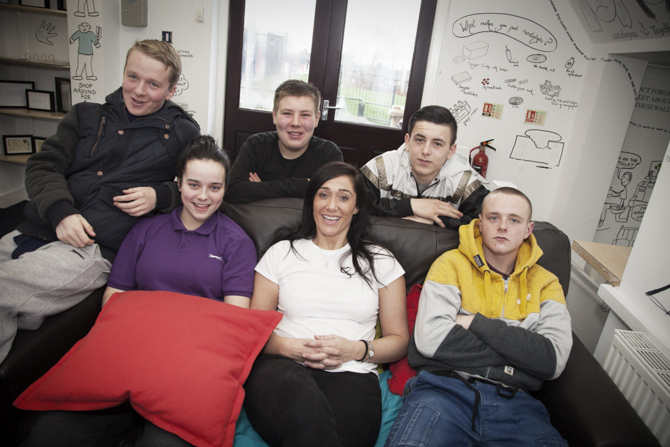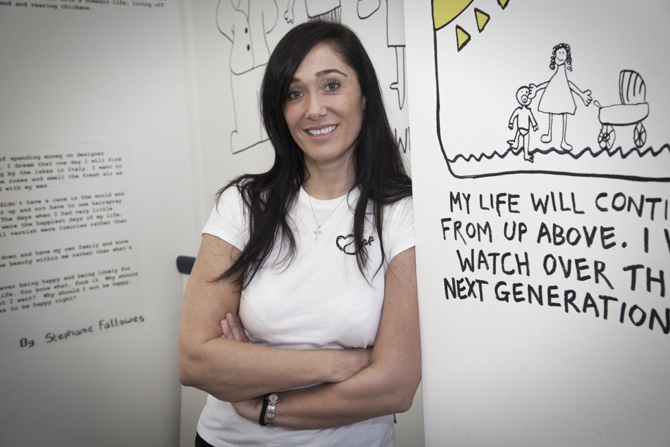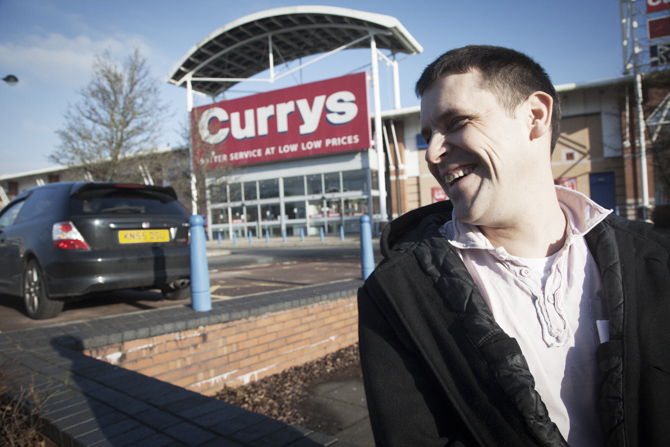…continued from A family not an agency
“So, what happened to Nathan?” I ask.
“He came to one of our wrestling sessions… and got beaten by a girl! He couldn’t believe it! He’d had an horrific upbringing and had never seen women as being strong in any way. It blew his mind.
“So then he started coming every week… he trained and trained. He got good at it and started winning competitions nationally and then internationally.
“And he changed?”
“It took a long time,” says Andrea. “There were plenty of phone calls at two in the morning when something had gone wrong, it needed lots of patience.”
“Which is the difference, isn’t it? Between yourselves and a statutory agency?”
“I’m sure there are other good agencies out there but, in truth, I don’t know who else would have done that.”
“And, if you hadn’t done it, then Nathan would have been a gangster?”
“Yes, there’s no doubt about it. He would definitely had been in prison at a very young age. I’m not speaking ill of him: he would tell you the same.”
“That must give you a huge amount of satisfaction?”
“If I never did anything else, it was worth doing for Nathan.”
“Where is he now?” I ask.
“Living in Guam, four hours past Japan. He’s 26 now, married to a two-time Olympic wrestler. They have a beautiful baby – my goddaughter – and he’s a manager at Calvin Klein. He literally is living the dream.
“And even though he is halfway around the world, all our young people look up to him and see him as a role model. Whenever he’s back in the UK, he always comes here first.”

Jason, another on Andrea’s programme, is next up the stairs. We’ve already met. He and Andrea came to the UCAN the other week. I’m going to interview him for this blog soon.
She shows me his timetable. “Everything is tailor-made to that particular young person, that family, that child,” she says. “And there is never a timescale to our work… we’ll always be here for them.”
Jason’s week includes helping in the Heartlift office, group sports sessions, volunteering on community projects in Breightmet and even supporting Andrea and the team with a teatime session with primary school kids. It’s a lot about self-esteem and introducing a routine.
“These lads don’t think they can manage a full five-day week,” says Andrea. “So we’ve put this schedule together to show them they can.”
“And how do you dovetail with the UCAN?” I ask as Jason sets off downstairs.
“It’s a perfect partnership really. The UCAN offers all the things we don’t. We’re the emotional support and, the way I see it, these lads wouldn’t have the confidence to walk in the UCAN without us. So we make the introductions and once they feel comfortable they’ll go in on their own.”
“Looking at individual needs; seeing the whole person with compassion; non-judgmental empathy. I can see the similarities between the UCAN and Heartlift,” I say.
“Yes, and it means a lot to me to know that Vanessa understands and appreciates what we do.”
Before I wrap up our chat and, with an eye on my upcoming interview, I ask about Jason.
“When all the boys started the programme, they’d tend to show their emotions. If they were angry, you’d know about it. Jason wasn’t like that. Everyone thought he was a lovely kid. And he is. But, because I’ve been doing this for a long time, he concerned me most.
“We ended up unravelling a whole history of sadness. We took the time to keep asking if he was okay. And we kept showing him we cared. He knew he wouldn’t be judged and, whatever it was, we’d be there to support him.
“Eventually we started unpicking what had happened and he started to write things down in his diary. We uncovered all the stuff he had carried around all his life and, in particular, over the last four years… the stuff that had manifested itself in really destructive ways.
“Now that’s stopped and he’s getting it out of his system in words.”
“For three years I would have the same conversation with Nathan, ‘What are you going to do when you leave school?’ I’d ask him. ‘I want to be a gangster,’ he’d say, ‘that’s what I want to do.’”
Andrea is the founder of Heartlift, a small charity working on the Breightmet estate with small groups of, mainly, young men.
“He thought if he was a gangster he’d get loads of girls, a nice car and lots of money,” she says. “‘But you’ll also get 10 years in prison,’ I’d tell him. It was a risk he was prepared to take. Being a gangster was his ambition until he was 16.”
Nine years ago Andrea’s day job was as a defence solicitor where she saw plenty of young people stuck in the hamster wheel that is the criminal justice system.
“16- and 17-year-olds were getting sentences which would just be the beginning of a lifetime in and out of prison,” she recalls. “By the time they were in court, it was too late, there’s little you can do. I wanted to try and address the problems and work in prevention instead. So I set up Heartlift.”

We are in Andrea’s ‘bedroom office’ in a converted house a few streets away from the UCAN. It’s a Bolton at Home community hub, its white walls sprinkled with quotes and illustrations as part of an innovative arts project.
“How,” I ask, “do you describe Heartlift to others?”
Andrea doesn’t hesitate. “We love people back to life,” she says.
As if on cue, a couple of smart-looking teenage boys come bounding up the stairs and are greeted in our open doorway with a hug from Andrea. “Nice haircuts,” she says, and then to me, “I organised a couple of hairdressers last night and we had 21 kids here, all getting their hair cut.” The boys disappear, they have things to do.
“That’s the difference between us and other agencies. We care and love the people we work with and they know it.
“I know that is a risky thing to say but I think it’s what’s missing. We’ve lost the basic right to feel compassion and empathy, to be a human beings, haven’t we?
“Nowadays those working with young people are frightened of showing any sort of emotional empathy. They’ve become robots, and kids don’t understand that.”
“You think some professionals don’t get close enough?” I ask.
“As a worker in this field you have to protect yourself, I know that. But it’s gone too far the other way. You have to get close, you have to roll your sleeves up, it’s just not workable otherwise.
“From the family’s point of view, if they see someone who is not willing to support them all the way – and it does get messy – then they just feel they are being judged.”
“There’s no mention of it on your website,” I say, “but you’re a Christian charity, aren’t you?
“If you have to say you are a Christian charity then you’re doing something wrong. You should be showing it through your words and actions. I don’t believe in preaching to people. I don’t think it’s helpful.”
“Do the young people go to church?” I ask.
“I’ve never asked any of the kids to come to church, but often they are curious and ask if they can come along. That’s fine with me. We are faith-based, not faith-biased. It’s live and let live, isn’t it?”
continued in Living the Dream
This was the morning after the first episode of Benefits Street, the now controversial Channel Four documentary following benefit claimants on a single Birmingham street.
“Not one of them, I believe, want to get a job,” says Darren as we sit in the upstairs office. “It was just drink and drugs… skipping through life… it’s not typical of what it’s like on benefits. It’s probably one of the worst streets in Birmingham, but that’s not the point, no matter where you live you can try and find a job.
“No one on that programme were determined enough. They were getting out of bed and it was fag in mouth and can in hand. You just can’t do that.”
Darren is 37 but looks 25. Four years ago he had an operation on his feet and spent the next 18 months in a wheelchair. This month he’s just received the first pay packet he’s had for two years. He’s a UCAN success story and he doesn’t mind who knows.

“When I was out of work I’d get into a routine: every morning I’d come down to the UCAN. It’d get me out of the house, stop me looking at the four walls or watching TV. If you want a job, you have to have the right mindset.
“But that operation took me out for a long time. My self-esteem took a big knock. When someone sits you down and says, ‘It’s going to be difficult for you Darren, you’re going to have to learn to walk again’, then your confidence goes.”
“But you did do it,” I say, “you did learn to walk again.”
“Yeah. Yeah. I’ve done it. I still struggle a bit but if someone saw me on the street I’d just look like anyone else.”
Once recovered Darren got work through an agency as a warehouse order picker which he did for two years. He was then on benefits for a fortnight before he got another job doing the same kind of work. Five months later he was laid off. That was more than two years ago and it was then that he first started to use the UCAN.
“It’s been a tough time. Really tough. I wouldn’t want to do it again but you don’t have a choice, do you? At first I came to the UCAN every other day, then every day. I was unsure, shy really, and they helped me. I told them I wasn’t great on the computer and they put me on the IT course.
“I only had a paper CV – nothing I could email – and they helped me make a proper CV. Now I’ve got different CVs for different jobs and they’re absolutely immaculate, you’re not going to beat them.”
When Darren wasn’t spending time on the Work Programme – a compulsory ‘job club’ for the long term unemployed – he was at the UCAN sending off CVs. “Me, personally, I would be applying for 10 jobs a day. That’s me. That’s my preference.”
“Why? What makes you so motivated?” Daft question.
“Because I want a job. I believe, in my head, if you are determined enough, there’s something out there for everyone.”
“Are there enough jobs for people who want them, do you think?
“It depends what sort of job you want,” he says. “I believe if you aim too high you’ll only be disappointed. You have to be realistic. Believe me, I don’t want national minimum wage but you have to go for it. Anything else is a bonus. You can work your way up.”
Darren has now a job on the help desk of some security company. He receives calls when building alarms are triggered and sends an engineer to investigate. With his first wages he wandered into Currys and bought himself a washing machine.
As we’re talking I imagine what sort of TV programme the documentary team might have made had they followed Darren for the last twelve months. It wouldn’t be very exciting, and certainly wouldn’t make prime time.
There’d be hours of footage of Darren in front of the computer looking for work; shots of him cooking his own fresh food – “I’d rather make something myself than get a takeaway” – and not a single scene of drunken excess because, as he says, “for me, paying the bills is more important than drinking”.
If Benefits Street isn’t typical then maybe super-motivated, healthy-eating Darren isn’t either but there must be plenty of people in between.



